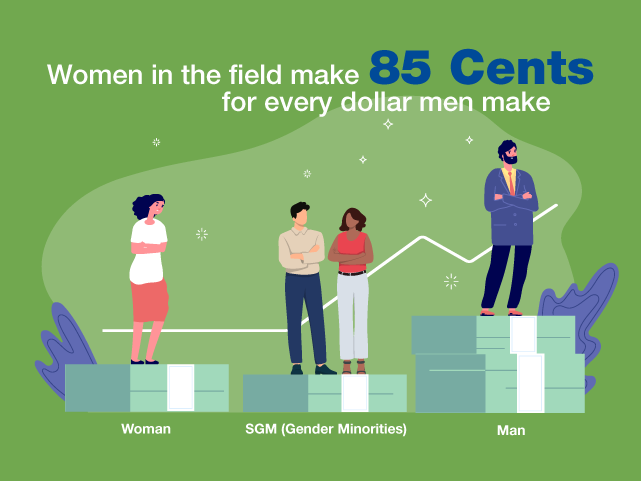When you’re in the job market, staying ahead of the curve is essential. To bring more transparency to salary and compensation for health services and policy researchers, and help our members position themselves competitively, AcademyHealth conducted a survey to examine how compensation varies across geographic regions, career levels, and gender. Additionally, because our recent member needs analyses indicate growing concern about burnout, the survey also considered other components of compensation as well as work culture, and satisfaction in the field.
The survey informed two valuable new AcademyHealth member benefits:
- the Salary Comparison Tool, an online interactive tool for researchers to search and compare their salary with their peers in the field
- a detailed members-only report, created in collaboration with the Department of Health Services Policy and Management at the University of South Carolina’s Arnold School of Public Health
The AcademyHealth Salary and Compensation Survey, conducted in 2023, was completed by 545 health services and policy researchers, yielding a 7.6 percent response rate.
Salaries show predictable variations by career level
Across all the career levels, executive leadership roles commanded the highest compensation, followed by mid to senior-level professionals, then early career professionals.
| Career Level | Mean Annual Salary |
| Executive-level | $230,238 |
| Mid-career and senior-level | $138,602 |
| Early-career | $104,562 |
The survey also found that analysts and associates in the research track have lower salaries, with a mean of $85,827 and a median of $80,500.
Regional variances also exist, with higher earnings in the Northeast and West compared to the South.
Salary varies based on specialty area, with Health Economists at the top
The Salary and Compensation Survey also revealed the variation in salary based on specialty areas. Health economists, with a mean salary of $189,234, earn significantly more than those in health policy ($139,928). Additionally, those who specialize in health workforce, and dissemination, implementation, and impact also have lower earnings.
Where you work matters
Those who selected teleworking as their primary location had significantly lower salaries generally. However, the difference in urban vs. suburban or rural locations was not a significant factor in salary variances after adjusting for other factors. Workplace settings (that is the type of organization/employer) also mattered, with federal government employees earning significantly less than those working in academia.
Gender- and race-based disparities in salary and compensation persist
The report also showed that historic pay gaps between individuals who identified as either men or women persist in health services and policy research. The research reflected that women make 85 cents for every dollar men make, with men receiving a mean salary of $158,864, while women make a mean salary of $134,919. *The survey examined the compensation of gender minorities, however not all career levels were represented by the respondents, therefore they are not included on this gender salary comparison.

The gender gap persists across career stages and workplace settings. Among early career professionals, men earn 15 percent more than women. Among mid-career researchers, men earn 13 percent more than women. For senior career level researchers show that men earn 10 percent more than women. Among federal government employees, men earned 24 percent more than women. In health care delivery organizations, men earned 19 percent more than women.
There were also differences in salaries based on race, but they were small across different career levels. However, when considering other factors (such as years of experience in health services and policy research, and area of specialty), gender and race/ethnicity were no longer strongly linked to salary differences.
As AcademyHealth is committed to Diversity, Equity, Inclusion, and Accessibility (DEIA) to increase transparency of salary disparities, the report also examined the impact of DEIA efforts in workplaces. Respondents reported transparency and demographic representation in leadership remained mixed. When choosing a job, professionals prioritized salary and work-life balance, reflecting the significance of these factors in career decision-making. Positive perceptions of DEIA at the organization correlated with higher salaries, emphasizing the importance of inclusive workplace cultures.
The 2023 AcademyHealth Salary and Compensation Survey underscores the importance of identifying compensation disparities and promoting pay equity within the health services and policy research field. In response, AcademyHealth launched the Salary Comparison Tool, which enables researchers to compare salary by career level, geographic location, and many other factors to bring into salary negotiations. The tool and report are open to AcademyHealth members only. Join now if you are not yet a member.
Want a deeper dive into the data? Join us on October 17 at 1:00 p.m. for an exclusive members-only webinar where we will explore the findings of the data with researcher, Maushmi Patel, Department of Health Services Policy and Management at the University of South Carolina’s Arnold School of Public Health. Register now.